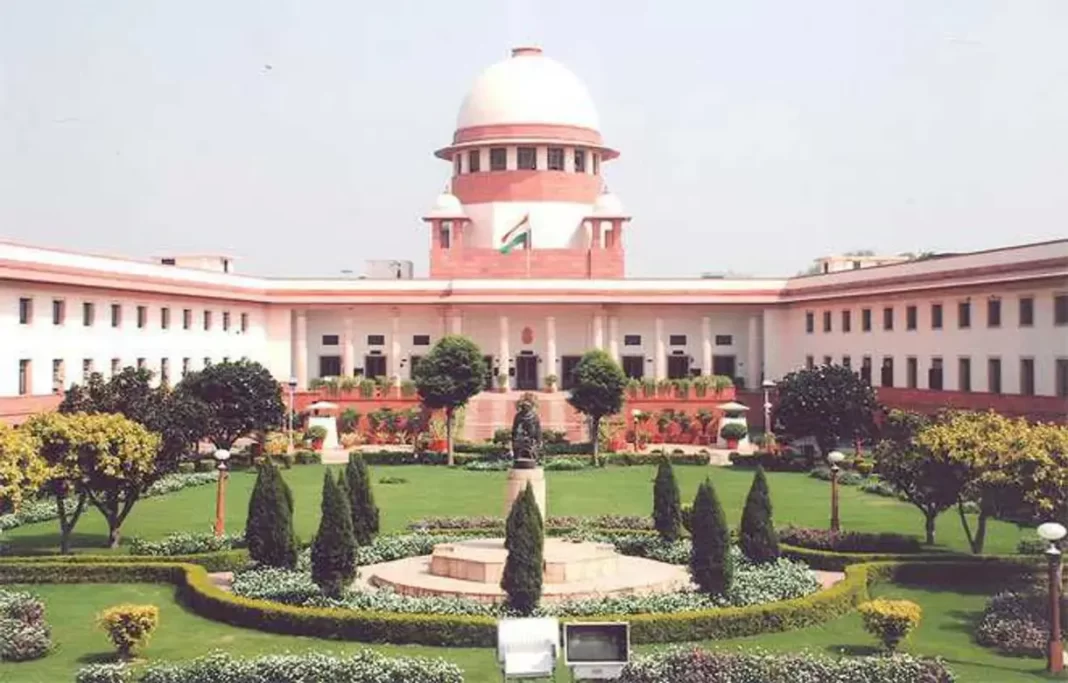The Supreme Court has refused to stay the order given by the Varanasi court on January 31 by which the Hindu parties were allowed to worship in the southern cellar of the Gyanvapi Mosque.
The parties were instructed to maintain status quo at the Gyanvapi premises to enable both the communities to offer religious prayers by the Bench comprising Chief Justice of India (CJI) DY Chandrachud, Justice JB Pardiwala and Justice Manoj Misra.
The Apex Court in its order stated that the status quo shall not be disturbed by either of the parties without obtaining the previous sanction and leave of this Court.
The Court said that Hindus will enter from south and pray in cellar, while Muslims will pray in northern side as they enter from there.
This arrangement will continue till the case is finally decided.
The Bench observed that at this stage, bearing in mind the fact that namaz was being offered by Muslim communities unhindered after the district court and High Court orders, and that prayers in tehkhana were limited to the Hindu priests, it was important to maintain the status quo, so that both communities could perform religious worship in above terms.
On February 26, the Allahabad High Court upheld the order given by the Varanasi Court on January 31, allowing prayers in the ‘Vyas Tehkhana’ (southern cellar of Gyanvapi Mosque).
The order was passed by the single-judge Bench of Justice Rohit Ranjan Agrawal on a petition filed by the Anjuman Intezamia Mosque Committee (which manages Gyanvapi Mosque in Varanasi) on February 1.
The High Court had earlier reserved its judgment after hearing arguments from both the parties.
The Anjuman Intezamia Mosque Committee had moved the High Court after the Supreme Court rejected its petition to urgently hear its plea challenging the Varanasi court order allowing puja in Vyas Ji ka Tehkhana.
Earlier in February 2024, the Hindu plaintiff apprised the High Court that even after 1993 when the CRPF took possession of the same, Puja-Path continued inside the Tehkhana.
Advocate Hari Shankar Jain, who appeared for the Plaintiff-Shailendra Kumar Pathak Vyas, submitted the same in a plea filed by the Gyanvapi Mosque committee challenging the January 31 order.
The order by the Varanasi Court permitted the Hindu parties to perform puja in the southern cellar of the Gyanvapi mosque (Vyas Ji ka Tehkhana).
It was submitted before the Court that till 1993, the Pooja was performed inside Vyas Tehkhana daily but post 1993,it happened only once a year.
It was also brought to notice that the Gyanvapi Mosque committee never objected to the same.
Advocate HS Jain submitted before a bench of Justice Rohit Ranjan Agrawal that the Mosque committee never had any possession of the cellar and thus could not object to pooja rituals.
While the Court made a prima facie observation that neither the Vyas family nor the Gyanvapi Mosque Committee could prove that they were in the possession of the Vyas Tehkhana (southern cellar of the Mosque)
the claim regarding the continuity of ‘Puja’ was made by the lawyer of hindu side.
The observation was made by the Single Judge while hearing the Mosque committee’s objection to the Varanasi Court’s January 31 order paving the way for the worshipping of Hindu deities inside the Vyas Tehkhana.
The January 31st order of the Varanasi District Judge was also justified by the Advocate HS Jain, stating that his first prayer (for appointment of a receiver) was allowed on 17th Jan, but somehow the second prayer (for performance of prayers inside Vyas Tehkhana) was not allowed.
The Hindu side approached the District Judge to allow the second prayer too, and that was allowed on January 31st.
For explaining and clarifying the matter,Jain referred to Section 152 of CPC which provides for the correction of clerical arithmetical mistakes in judgments, decrees or orders or errors arising therein from any accidental slip or omission, to justify the passing of the 31st January order wherein Hindu worship rituals were allowed by directing the DM to make proper arrangements for Puja-Raga Bhoga inside the tehkhana.
Advocate HS Jain talked about Sections 13 and 14 of the Uttar Pradesh Sri Kashi Vishwanath Temple Act, 1983 to contend that there exists a mandate for the Kashi Vishwanath Trust Board to get pooja performed and the 31st January order aligns with the mandate of the Act.


